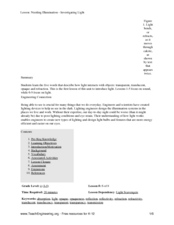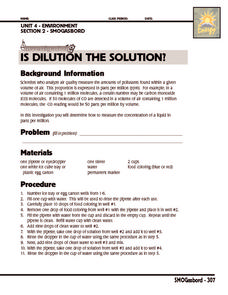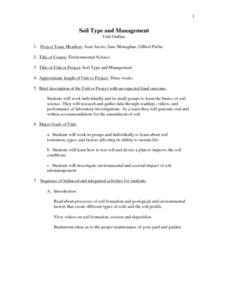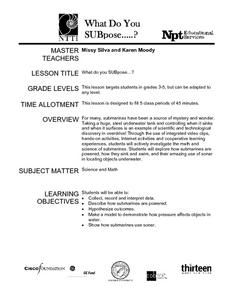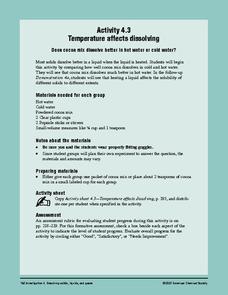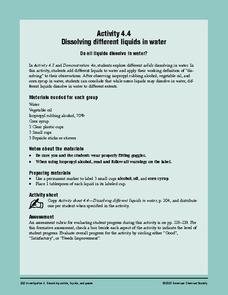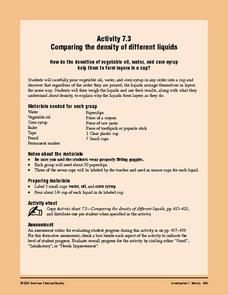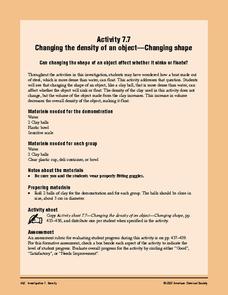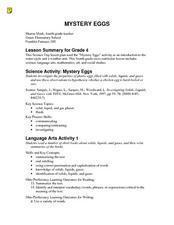Curated OER
Investigation - What's the Number?: Division
Seventh graders explore number sentences using a variety of strategies making each equation a true sentence. Students examine strategies such as patterns, trial and error, working backwards, and related problems. In groups, 7th graders...
Curated OER
Investigating Light
Students study concepts associated with light. In this light activity, students observe an demonstration by the teacher. They examine reflection and refraction of light and name things that reflect light and those that refract it. They...
Curated OER
Investigating Mitosis in Allium Root Tip Squash
Preparing the root tip samples is the most challenging part of the mitosis-viewing lab found here, but the directions help ensure you have everything you need. There is no worksheet included; however, there is a sample data table....
Texas State Energy Conservation Office
Investigation: Is Dilution the Solution?
Systematically diluting a full-strength sample of food coloring is meant to help earth scientists understand concentration in parts per million. While they will enjoy the lab exercise, it might be a challenge to help them relate it to...
Curated OER
Investigating Fraction Circles
Add and subtract fractions with common denominators! In this fractions lesson, upper graders review what they already know about fractions, use manipulatives to compare fractions, and add and subtract fractions.
Curated OER
Magnets are forceful
You could use this worksheet two different ways. As is, or you could have learners actually do the experiment shown. They are to determine which magnet is strongest by counting the number of paper clips hanging from it. Why not get five...
Mathematics Assessment Project
Pythagorean Triples
What special relationships exist in right triangles? In the high school performance task, learners investigate Pythagorean triples. They then determine rules for the perimeter and area of right triangles given the shortest side.
Curated OER
Soil Type and Management
Students study the basics of soil science. They research and gather data through readings, videos, and performance of laboratory investigations. As a team they generate oral and written recommendations for the amendment of soil.
Curated OER
Our Solar System and Seasons
Sixth graders investigate the relative diameters of planets and distances between them and the cause for seasons on Earth using the 5-E Learning Model. They appreciate the size and distances involved with objects in the real universe....
National Endowment for the Humanities
The House Un-American Activities Committee
Was the House Un-American Activities Committee justified in investigating subversive influences in the entertainment industry? Part two of the three-part series of lessons that examine the anti-communism movement after World War II,...
Curated OER
Dilations in the Plane
Tenth graders investigate dilations and explore the dilation transformation before investigating the properties of a dilation using Cabri Jr. High schoolers extend the concept of dilatation to the coordinate plane.
Curated OER
Isopod Behavior, of the Rolly Polly Lab
Students investigate the behavior of isopods. In this isopod lesson plan, students make observations of an isopod and sketch the pillbug. They study the orientation of the isopods in relation to moisture in a chamber they construct from...
Curated OER
What Do You SUBpose?
Submarines are the fous of this math and science instructional activity. In it, learners explore the world of submarines: how they work, and what they are used for. They engage in hands-on activities, watch video clips, and work in...
Curated OER
Data Analysis Using Technology
Analyze data using technology. Middle schoolers design data investigations, describe data, and draw their own conclusions. Then they select the best type of graph, graph and interpret the data, and look for patterns in trends. They also...
American Chemical Society
Using the Combining Test to Identify Unknown Liquids
Once investigators have learned how their mystery liquids interact with water during the preceding activity, they now use their observations to identify them. This is an ideal conclusion to the mini unit on the properties of water.
American Chemical Society
Temperature Affects Dissolving
Stir chocolate drink mix into hot and cold water to see if there is a difference in how quickly it dissolves. Number three in a six-lesson unit on dissolving, this installment investigates the effect of temperature. If you consult the...
American Chemical Society
Dissolving Different Liquids in Water
Not many youngsters realize that solids aren't the only materials that can possibly be dissolved in water. During this investigation, they find out that some liquids can dissolve in water as well. This is part of a unit on solubility,...
American Chemical Society
Comparing the Density of Different Liquids
Learners will like making a liquid layer cake to investigate the relative densities of various liquids: water, oil, and corn syrup. They will also introduce a few solid materials to find out how their densities compare. Standing alone,...
American Chemical Society
Changing the Density of an Object - Changing Shape
Continuing with the concept of volume and its effect on density, learners now work with a piece of clay to see if they can get it to float in water. This is a memorable end to a seven-part investigation of density. Make sure to check out...
Columbus City Schools
ABC: Acid Base Chemistry
Bubble, bubble, boil and trouble! What causes common substances like baking soda and vinegar to react the way they do? Welcome your junior chemists to the wonders of acid-base chemistry using a comprehensive and fun...
Curated OER
Close Encounters
Students investigate the cause of death of a fictitious school janitor. They develop hypotheses based on information discovered by examining the labels of household chemicals.
Curated OER
Mystery Eggs
Students investigate the properties of plastic eggs filled with solids, liquids, and gases and use these observations to hypothesize whether a chicken egg is hard-boiled or raw.
Curated OER
Autism - What Is It?
High schoolers investigate the symptoms of autism spectrum disorders, and compare expected child development with development that may indicate a diagnosis of these disorders. The final project for the instructional activity is the...
Curated OER
Shape Up!
An outstanding lesson on teaching the basic shapes and polygon names to young geometers is here for you. In it, learners investigate the role of basic polygons in the strength of structures. They use geoboards, rubber bands, streamed...
Other popular searches
- Mathematical Investigations
- Scientific Investigations
- Science Investigations
- Field Investigations
- Hands on Investigations
- Designing Investigations
- Math Investigations
- Conducting Investigations
- Class Investigations
- Crime Scene Investigations
- Pythagoras Investigations
- Water Cycle Investigations

